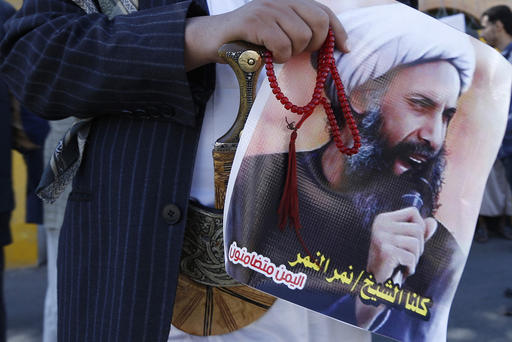-
Tips for becoming a good boxer - November 6, 2020
-
7 expert tips for making your hens night a memorable one - November 6, 2020
-
5 reasons to host your Christmas party on a cruise boat - November 6, 2020
-
What to do when you’re charged with a crime - November 6, 2020
-
Should you get one or multiple dogs? Here’s all you need to know - November 3, 2020
-
A Guide: How to Build Your Very Own Magic Mirror - February 14, 2019
-
Our Top Inspirational Baseball Stars - November 24, 2018
-
Five Tech Tools That Will Help You Turn Your Blog into a Business - November 24, 2018
-
How to Indulge on Vacation without Expanding Your Waist - November 9, 2018
-
5 Strategies for Businesses to Appeal to Today’s Increasingly Mobile-Crazed Customers - November 9, 2018
Saudi Arabia executes 47 men for ‘terrorism charges’ including top Shia cleric
A senior Iranian cleric says the execution of prominent Shia cleric Sheikh Nimr al-Nimr indicates that Saudi Arabia seeks to trigger sectarian strife between Shia and Sunni Muslims.
Advertisement
Saudi Arabia executed a prominent Shi’ite Muslim cleric and dozens of al Qaeda members on Saturday, signalling it would not tolerate attacks, whether by Sunni jihadists or minority Shi’ites, and stirring sectarian anger across the region.
Sheikh Nimr’s family said he had been found guilty, among other charges, of seeking “foreign meddling” in the kingdom but his supporters say he advocated only peaceful demonstrations and eschewed all violent opposition to the government.
The Islamic kingdom detained thousands of militant Islamists after a series of al-Qaeda attacks from 2003-06 that killed hundreds, and has convicted hundreds of them.
After listing the names and images of those executed, Saudi state television showed black-and-white footage of previous terror attacks in the kingdom, one showing bodies in a mosque after an attack.
A spokesperson with Iran’s foreign ministry, Hossein Jaber Ansari, was said to have issued a statement that Saudi Arabia would “pay a high price” for the execution of the Shia cleric, with whom the largely Shia nation was sympathetic, according to Al Jazeera.
In Iran, a Shiite theocracy and rival to Saudi Arabia, state media channels carried non-stop coverage of clerics and secular officials eulogizing Nimr and predicting the downfall of Saudi Arabia’s Sunni ruling family.
Sheikh Nimr al-Nimr had been a vocal critic of the Saudi Arabian government and was among seven activists whose death sentences were upheld earlier this year. “He was innocent and his execution is the example of injustice of the justice system in Saudi Arabia”.
The vast majority of those executed were Saudi citizens, although one Egyptian and one Chadian were put to death, the Interior Ministry said.
Al-Nimr was a central figure in protests that erupted in 2011 as part of the Arab Spring, and his execution may spark new unrest among the oil powerhouse’s Shia minority. Almost all executions carried out in Saudi Arabia are by beheading with a sword. Al-Nimr was No. 46, expressionless with a grey beard, his head covered with the red-and-white scarf traditionally worn by Saudi men.
Maya Foa, a spokeswoman for rights group Reprieve, said 4 of the 47 were political prisoners.
Al-Nimr did not deny the political charges against him, but said he never carried weapons or called for violence.
But the killings represent far more than just Saudi hatred for a cleric who rejoiced at the death of the former Saudi interior minister – Mohamed bin Nayef’s father, Crown Prince Nayef Abdul-Aziz al-Saud – with the hope that he would be “eaten by worms and will suffer the torments of hell in his grave”.
Al-Nimr’s brother told the AP by telephone that the executions came as a “big shock” because “we thought the authorities could adopt a political approach to settle matters without bloodshed”.
Advertisement
Mustafa Alani, a security analyst close to the Interior Ministry, commented: “There is a huge popular pressure on the government to punish those people”. Between January and November 2015, Saudi Arabia executed at least 151 people, amounting to its highest recorded number of executions in a single year since 1995. There are now real concerns that those protesters sentenced to death as children could be next in line to face the swordsman’s blade. Amnesty International describes Ali al-Nimr as a juvenile offender because he was 17 years old in February 2012 when he was arrested.




























